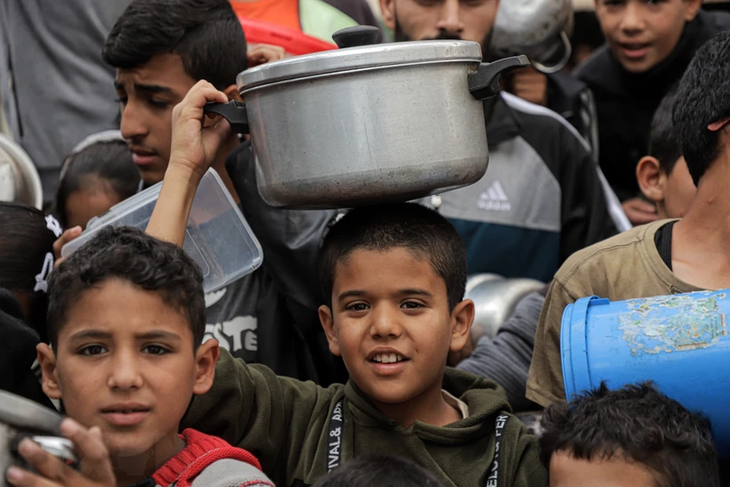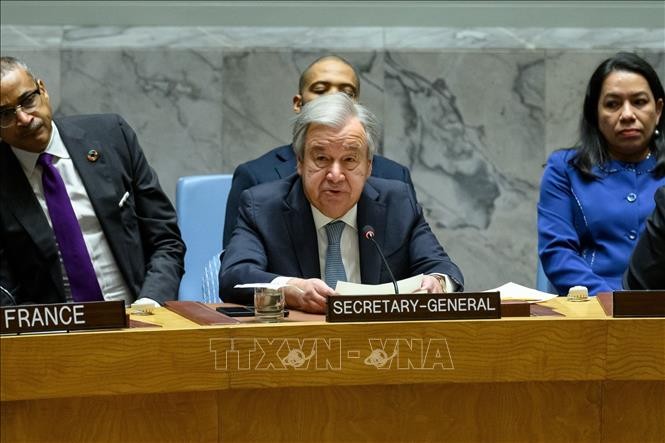(VOVWORLD) - The UN Security Council last week held an open session on climate change and conflicts, considering them the two most serious interwoven factors causing famine in the world, thereby eroding the environment of international peace and security.
 Children wait for food relief in Rafah, the Gaza Strip. (Photo: XNA/ VNA) Children wait for food relief in Rafah, the Gaza Strip. (Photo: XNA/ VNA) |
The UNSC discussion, themed "The impact of climate change and food insecurity on maintaining international peace and security", took place on February 13-14 at the initiative of Guyana, the rotating presidency of the UNSC in February. The UN Secretary General and representatives of 90 countries and many international organizations participated in the discussion.
Conflicts and climate change increase poverty
The participants said the world is entering a new unstable period when the combined impacts of climate change and conflicts are accelerating food insecurity globally.
 UN Secretary General Antonio Guterres at the UNSC meeting on food insecurity and climate change in New York on February 13, 2024. (photo: XNA/ VNA) UN Secretary General Antonio Guterres at the UNSC meeting on food insecurity and climate change in New York on February 13, 2024. (photo: XNA/ VNA) |
UN Secretary General Antonio Guterres said that conflicts have forced millions of people to evacuate and destroyed agricultural production infrastructure, while climate change has increased extreme weather phenomena such as droughts, floods, and sea water intrusion. The combined impacts destroy crops, reduce food productivity, and change traditional agricultural and fishery methods.
The World Food Program (WFP) estimates that over 330 million people were affected by acute food insecurity in 2023. Executive Secretary of the UN Framework Convention on Climate Change, Simon Stiell, said: “Only a few years ago, the world believed we could eradicate hunger. Today, one in ten people on earth already suffers from chronic hunger. That number is unacceptable. If climate change accelerates, it will only become worse. Climate change is contributing to food insecurity and to conflict”.
Deputy Director-General of the Food and Agriculture Organization (FAO), Beth Bechdol, said that said climate and conflict are the most important issues requiring urgent action to address global food insecurity.
“We have heard it said many times, that there is no food security without peace, and no peace without food security. We have seen firsthand how conflict leads to hunger and malnutrition, and it is no coincidence that half of the world's hungry people live in conflict-affected zones,” said Bechdol.
Bechdol noted that the conflict between Russia and Ukraine and in the Gaza Strip are clear illustrations of the impacts of conflicts on food security. She noted that the Ukrainian agriculture sector has lost an estimated 40 billion USD while about 2.2 million people in Gaza are suffering from severe hunger at different degrees.
Urgent actions needed
The UN Secretary General has called on the international community to take urgent actions, as hunger always leads to chaos.
“Without action, the situation will deteriorate. Conflicts are multiplying. The climate crisis is set to spiral, as emissions continue to rise. To avoid mounting threats to international peace and security, we must step in. And act now to break the deadly links between conflict, climate, and food insecurity,” said UN Chief Guterres.
Guyana’s Foreign Minister Hugh Hilton Todd said the UN Security Council needs to quickly adopt a long-term strategy, based on comprehensive risk assessments, and use data and analytics to build a new sustainable global food system.
FAO Deputy Director-General Bechdol said it is urgent to build an agricultural food system responsive to climate change, covering the entire food production process from cultivation to preservation. The first step should be to develop sustainable livelihoods for the populations most vulnerable to climate change.
At an international conference on Wednesday in Italy, President of the UN International Fund for Agricultural Development (IFAD), Alvaro Lario, called for more investment in agricultural innovation, focusing on small and medium-sized agricultural models in rural areas.
He said about 3 billion people living in rural areas of developing countries, who mostly do small scale agricultural production, receive only 1% of global climate finance.
Lario underscored that this fact should be changed because farmers are the first people to be directly affected by climate change and they should be better equipped with finance and technology.